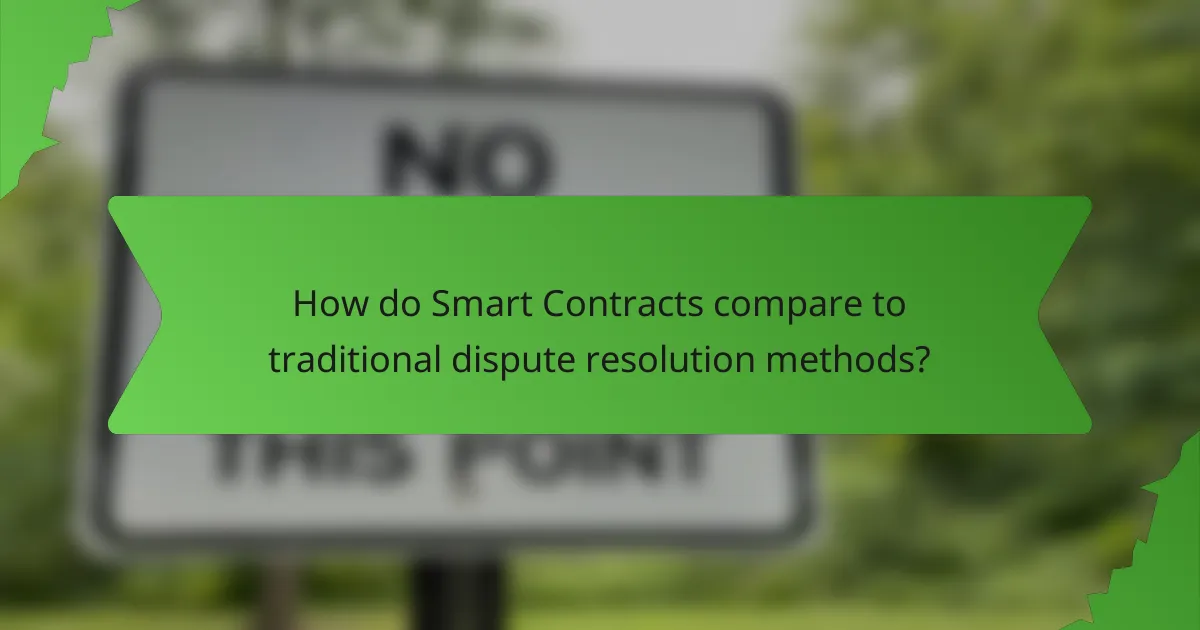Smart contracts are self-executing agreements with terms encoded in software, operating on blockchain technology for enhanced transparency and security. This article explores the role of smart contracts in crypto dispute resolution, highlighting their ability to automate agreement enforcement, reduce costs, and eliminate intermediaries. Key benefits include instant execution of predefined conditions, improved trust among parties, and minimized human error. However, the effectiveness of smart contracts is influenced by factors such as code accuracy, legal recognition, external data integration, contract complexity, and user understanding. The discussion will provide insights into both the advantages and limitations of using smart contracts in resolving disputes within the cryptocurrency landscape.

What are Smart Contracts and How Do They Function in Crypto Dispute Resolution?
Smart contracts are self-executing contracts with the terms directly written into code. They operate on blockchain technology, ensuring transparency and security. In crypto dispute resolution, smart contracts automate the enforcement of agreements. They eliminate the need for intermediaries, reducing costs and time. Disputes can be resolved through predefined conditions coded into the contract. If conditions are met, the contract executes automatically, providing a clear resolution. This process enhances trust among parties involved. The immutability of blockchain ensures that once deployed, the contract cannot be altered, safeguarding against fraud.
How do Smart Contracts automate processes in dispute resolution?
Smart contracts automate processes in dispute resolution by executing predefined rules without human intervention. They operate on blockchain technology, ensuring transparency and security. When a dispute arises, smart contracts automatically trigger actions based on the conditions coded within them. This reduces the need for intermediaries, speeding up resolution times. For example, if a payment is not made, the smart contract can automatically release funds to the aggrieved party. Additionally, they maintain an immutable record of transactions, which can serve as evidence in disputes. This automation minimizes errors and enhances trust among parties involved.
What programming languages are commonly used for Smart Contracts?
Solidity and Vyper are the most commonly used programming languages for Smart Contracts. Solidity is the primary language for Ethereum Smart Contracts. It is statically typed and designed for developing decentralized applications. Vyper is an alternative to Solidity, focusing on simplicity and security. Both languages are tailored for the Ethereum Virtual Machine (EVM). Other languages like Rust and Go are also used, particularly for platforms like Polkadot and Hyperledger. These languages facilitate the creation of secure and efficient Smart Contracts across various blockchain ecosystems.
What are the key components of a Smart Contract?
The key components of a smart contract include code, execution environment, and conditions. The code defines the terms and rules of the agreement. The execution environment is the blockchain platform that processes the contract. Conditions are specific requirements that must be met for the contract to execute. These components work together to automate transactions without intermediaries. Smart contracts are immutable, meaning once deployed, they cannot be altered. This ensures security and trust in the agreement. Additionally, they are transparent, allowing all parties to verify the terms.
What are the primary benefits of using Smart Contracts in crypto dispute resolution?
Smart contracts provide automation, transparency, and efficiency in crypto dispute resolution. They execute predefined terms automatically, reducing the need for intermediaries. This automation accelerates the resolution process. Transparency is enhanced as all parties can access the contract’s terms and execution history. This builds trust among participants. Additionally, smart contracts minimize human error and bias. They operate on blockchain technology, ensuring data integrity and security. This makes the dispute resolution process more reliable and less prone to manipulation.
How do Smart Contracts enhance transparency in dispute resolution?
Smart contracts enhance transparency in dispute resolution by automating and recording all transactions on a blockchain. This technology ensures that all parties have access to the same information in real-time. Each action taken within the contract is timestamped and immutable, preventing tampering. The rules of the contract are predefined and visible to all participants. This visibility reduces misunderstandings and builds trust among parties. Additionally, smart contracts can facilitate automatic execution of terms when conditions are met, further minimizing the potential for disputes. The transparency provided by blockchain technology allows for an auditable trail of all actions taken. This can be crucial in resolving disputes efficiently and fairly.
What cost savings can be achieved through Smart Contracts?
Smart contracts can achieve significant cost savings by automating processes and reducing the need for intermediaries. They eliminate manual work, which decreases labor costs. Smart contracts execute transactions automatically when conditions are met. This automation reduces the time and resources spent on contract management. Furthermore, they minimize errors and disputes, which can be costly to resolve. According to a report by Accenture, organizations can save up to 30% in transaction costs using smart contracts. This efficiency leads to faster and cheaper transactions overall.
What limitations do Smart Contracts face in the context of dispute resolution?
Smart contracts face significant limitations in dispute resolution due to their inherent rigidity. They operate on predetermined conditions and lack the flexibility to adapt to unforeseen circumstances. This inflexibility can hinder their ability to address complex disputes that require nuanced understanding. Additionally, smart contracts often lack a legal framework for enforcement, making it difficult to resolve disputes through traditional legal channels. Furthermore, the reliance on code means that any bugs or errors in the contract can lead to unintended outcomes. Consequently, parties may find it challenging to seek recourse or modifications if issues arise. These limitations underscore the need for supplementary mechanisms to effectively address disputes involving smart contracts.
What are the challenges related to Smart Contract enforcement?
Smart contract enforcement faces several challenges. One significant challenge is the immutability of smart contracts. Once deployed, they cannot be changed without consensus from all parties involved. This can lead to issues if a contract contains errors or if circumstances change. Another challenge is legal recognition. Many jurisdictions do not yet recognize smart contracts as legally binding. This creates uncertainty in enforcement. Additionally, smart contracts rely on external data through oracles. If these oracles provide inaccurate information, the contract may execute improperly. There are also challenges related to user understanding. Many users lack the technical knowledge to create or manage smart contracts effectively. Finally, security vulnerabilities pose risks. Smart contracts can be subject to hacking, leading to financial losses. These challenges collectively hinder the effective enforcement of smart contracts.
How do legal ambiguities affect Smart Contracts in dispute scenarios?
Legal ambiguities can significantly impact Smart Contracts in dispute scenarios. These ambiguities create uncertainty regarding the interpretation of contract terms. When terms are not clearly defined, parties may have differing understandings of their obligations. This can lead to disputes that are difficult to resolve through automated processes. Furthermore, legal frameworks governing Smart Contracts may not be well-established, complicating enforcement. In jurisdictions with unclear regulations, courts may struggle to apply traditional legal principles. This can result in inconsistent rulings and increased litigation costs. Ultimately, legal ambiguities undermine the reliability of Smart Contracts in dispute resolution.

How do Smart Contracts compare to traditional dispute resolution methods?
Smart contracts automate and enforce agreements without intermediaries, unlike traditional dispute resolution methods. Traditional methods often involve lengthy processes, including mediation or litigation, which can be costly and time-consuming. Smart contracts execute predefined conditions instantly, reducing delays. They also enhance transparency, as all parties can access the same information on the blockchain. Traditional methods may lack this level of visibility, leading to disputes over interpretations. Furthermore, smart contracts minimize human error by relying on code. In contrast, traditional methods depend on human judgment, which can be subjective. Overall, smart contracts offer efficiency, cost-effectiveness, and reliability compared to traditional dispute resolution methods.
What are the main differences between Smart Contracts and traditional contracts?
Smart contracts are self-executing contracts with the terms directly written into code. Traditional contracts require manual enforcement and interpretation by parties involved. Smart contracts operate on blockchain technology, ensuring transparency and security. In contrast, traditional contracts often rely on legal systems for enforcement. Smart contracts execute automatically when conditions are met, eliminating the need for intermediaries. Traditional contracts typically require third-party involvement, such as lawyers or notaries. Smart contracts are immutable once deployed, while traditional contracts can be altered if all parties agree. Lastly, smart contracts can reduce transaction costs and time significantly compared to traditional contracts.
How does the speed of resolution differ between Smart Contracts and traditional methods?
Smart contracts resolve disputes significantly faster than traditional methods. Traditional methods often involve lengthy legal processes, which can take weeks or months to reach a resolution. In contrast, smart contracts execute automatically once predefined conditions are met. This automation eliminates the need for intermediaries, reducing time delays. For example, a smart contract can trigger payments instantly upon verification of conditions. Studies show that smart contracts can reduce resolution time to mere minutes. This speed enhances efficiency in transactions and dispute management. The automation and transparency of smart contracts contribute to their rapid resolution capabilities.

What factors influence the effectiveness of Smart Contracts in resolving disputes?
The effectiveness of smart contracts in resolving disputes is influenced by factors such as code accuracy, legal enforceability, and external data integration. Code accuracy ensures that the smart contract functions as intended. If the code contains errors, it may lead to unintended outcomes. Legal enforceability refers to the recognition of smart contracts by legal systems. Jurisdictions vary in their acceptance of smart contracts as binding agreements. External data integration involves the use of oracles to provide real-world data to the smart contract. Accurate data is crucial for executing contract terms correctly. The complexity of the contract also plays a role. More complex contracts may lead to greater ambiguity in dispute resolution. Lastly, user understanding of the smart contract terms impacts effectiveness. If users do not fully understand the terms, disputes may arise more frequently.
How does the complexity of a dispute impact Smart Contract effectiveness?
The complexity of a dispute significantly impacts Smart Contract effectiveness. Simple disputes can often be resolved automatically by Smart Contracts without human intervention. However, complex disputes may involve multiple parties, nuanced interpretations, and varying legal frameworks. These factors can complicate the execution of Smart Contracts, leading to potential failures in enforcement. For instance, if a Smart Contract is designed to execute based on specific conditions, unforeseen complexities might prevent it from functioning as intended. Research indicates that 70% of Smart Contracts fail due to ambiguous terms or complex conditions that are not adequately defined. Thus, the effectiveness of Smart Contracts is directly correlated to the clarity and simplicity of the disputes they aim to resolve.
What role does the underlying blockchain technology play in Smart Contract performance?
The underlying blockchain technology is crucial for Smart Contract performance. It provides a decentralized and immutable ledger for executing agreements. This technology ensures transparency, as all transactions are recorded and visible to participants. Blockchain also enhances security, reducing the risk of tampering or fraud. Smart Contracts automatically execute when predefined conditions are met, relying on blockchain for accurate data verification. The consensus mechanism of blockchain confirms the validity of transactions, ensuring reliable performance. Additionally, the use of smart contracts on platforms like Ethereum showcases the efficiency of blockchain in automating processes. Overall, blockchain technology is integral to the functionality and reliability of Smart Contracts.
What best practices should be followed when implementing Smart Contracts for dispute resolution?
Define clear terms and conditions in the smart contract. This ensures that all parties understand their rights and obligations. Use standardized templates to enhance clarity and reduce ambiguity. Implement an automated dispute resolution mechanism within the contract. This allows for quick resolutions without human intervention. Include a multi-signature feature to enhance security and prevent unauthorized changes. Regularly audit the smart contract code for vulnerabilities and compliance. This practice helps maintain integrity and trust in the system. Provide a user-friendly interface for parties to access and manage disputes. This encourages participation and adherence to the process. Finally, educate all parties involved about how the smart contract operates. This increases confidence and reduces potential conflicts.
How can parties ensure clarity in Smart Contract terms to avoid disputes?
Parties can ensure clarity in Smart Contract terms by using precise language and defining all relevant terms. Clear definitions help eliminate ambiguity. They should also include detailed conditions for performance and consequences for non-compliance. Furthermore, parties should agree on a dispute resolution mechanism within the contract. This can provide guidance if disagreements arise. Regular reviews and updates of the contract terms can also enhance clarity. According to a study by the World Economic Forum, clear contractual language reduces the likelihood of disputes in smart contracts. This highlights the importance of clarity in preventing misunderstandings.
What are the recommended steps for auditing Smart Contracts before deployment?
The recommended steps for auditing Smart Contracts before deployment include several critical phases. First, conduct a thorough code review. This identifies potential vulnerabilities in the Smart Contract’s logic. Next, perform automated testing using tools like Mythril or Slither. These tools help detect common security issues. Following that, engage in manual testing to evaluate edge cases and unexpected behaviors.
Additionally, consider conducting a formal verification process. This mathematically proves the correctness of the Smart Contract’s code. After testing, obtain a third-party audit from a reputable firm. This provides an independent assessment of the Smart Contract’s security. Finally, ensure comprehensive documentation of the audit process and findings. This transparency is crucial for future reference and trust.
Smart contracts are self-executing agreements with terms written in code, operating on blockchain technology to enhance transparency and security in crypto dispute resolution. This article examines the benefits of smart contracts, including automation, cost savings, and reduced reliance on intermediaries, while also addressing their limitations such as rigidity, legal ambiguities, and enforcement challenges. Key components, programming languages, and best practices for implementing smart contracts are also discussed to provide a comprehensive understanding of their role in resolving disputes efficiently and reliably.




